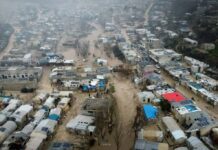
The Syrian conflict has been a humanitarian crisis of immense proportions, with millions of people relying on aid for their survival. However, the start of 2024 has seen a significant decrease in external aid to Syria, particularly in the northwestern region, prompting local organizations and authorities to step up their efforts to provide internal aid and support to compensate for the shortfall.
According to the United Nations Office for the Coordination of Humanitarian Affairs (OCHA), the number of aid trucks entering northwestern Syria in January 2024 experienced a sharp decline. Only 43 aid trucks crossed the border between January 2 and 16 through the Bab al-Hawa and Bab al-Salama crossings. This marked a stark contrast to the previous month, where 547 aid trucks entered the region, highlighting a tenfold decrease in aid volume.
The implications of this decline in external aid have been severe, especially in the aftermath of the earthquake in northern Syria, which caused damage estimated at more than $5 billion, as reported by the Syrian Civil Defense. In response to this crisis, the Assad regime announced an extension of the UN’ permission to bring aid through the Bab al-Hawa crossing for six months, and the extension of work at the Bab al-Salama and al-Rai crossings for three months.
In light of these developments, local organizations and authorities have been mobilizing to fill the gap left by the decrease in external aid. The Syrian Response Coordinators team revealed a new agreement between the United Nations and various parties, including the Assad regime, to extend the entry of international humanitarian aid into northwestern Syria through the Bab al-Hawa border crossing with Turkey for an additional six months. However, the Humanitarian Action Coordination Office (HAC) in Idlib has called for permanent channels for the entry of aid without time restrictions, emphasizing the urgency of the situation.
Local initiatives have also been instrumental in providing essential aid to affected communities. The Syrian Salvation Government (SSG) Ministry of Development and Humanitarian Affairs in Idlib has been proactive in delivering emergency aid, including blankets, heating materials, and food baskets to those in need through the Warmth of Winter campaign which began in December. Additionally, the Ministry of Education has distributed heating diesel to schools in specific areas, while the Directorate of Humanitarian Affairs in the Central Region has provided relief aid to impoverished families as part of the second phase of the Warmth of Winter campaign.
The decrease in external aid to Syria has undoubtedly created a challenging environment for those reliant on humanitarian assistance. However, the proactive response of local organizations and authorities, coupled with the extension of international aid permissions, reflects a concerted effort to mitigate the impact of decreased external aid and ensure that essential support reaches those in most in need.








